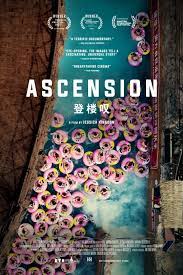
ASCENSION
US, 2021, 95 minutes, Colour.
Directed by Jennifer Kingdon.
An extraordinary array of visuals. However, no voice-over, no clear narration thrust.
For those who appreciate the visuals, they will be more than satisfied. For audiences who want some backgrounding, some information, some interpretation – it is over to the audience themselves.
The film opens with a quotation from the great-grandfather of the director (who was also responsible for screenplay, photography, editing). He speaks of people looking up to ascend a tower, out of reach, growing problems. (And it ends with the ascent of the tower and the climber looking around and seeing that everything has been razed.)
By the end of the film, audiences may well be amazed at how much footage the director has been able to photograph in China itself, a seeming freedom movement, freedom to encounter all kinds of people, in training, instructors, management. In fact, this is a very strong visual film about capitalism, all the more surprising since the setting is the People’s Republic of China, ruled by a Communist government, with socialist aims. However, we are well aware that there are many millionaires in China, Chinese investment in property all over the world, Chinese involvement in casinos and Chinese highrollers.
There is a development in the presentation of the images, something like the cinema equivalent of a gallery installation, the audience moving from one image to the next. The development spends a considerable amount of time at the opening of the film showing the range of men and women trying to get jobs, the spruiking of jobs, the low payment, working conditions, and then a collage of detailed and repetitive work, literal hands-on, yet vast machinery, workers at a factory producing bottled water.
The development keeps going up the stages, to the training of men and women for more upmarket jobs – although, with mention of Downton Abbey, there seems to be some emulation of repeating that British lifestyle amongst the affluent families in China, training to be butlers, to lay tables with precision (perhaps they should check Remains of the Day). And it moves on to upper management, well-dressed young men and women, being instructed by experts whom they applaud. And the levels of management go higher.
In the meantime, there is a more physical training of police men and women, much more regimented, with touches of violence by the instructors. Some martial arts.
Ultimately, there is social gatherings, parties, dinners, with speeches from the CEOs of vast businesses, urging improvement of production, rivalling the US, wanting to outdo it in particular markets.
Which means then that this vision of China is not exactly what the revolutionaries of 1949 may have had in mind, nor those during the Cultural Revolution, but a gradual change of perspective with greater wealth, international markets, greater communication – and, as everywhere else, the young people are seen bent over their mobile phones. And some playing computer games.
This is a very urban scene, not a farmer insight, not a country village, not a poor neighbourhood. We do see some domestics and cleaning, some grounds people (someone hunched in the heat while a petulant model being photographed complains about how hot it is).
Nominated for an Oscar for Best Documentary.